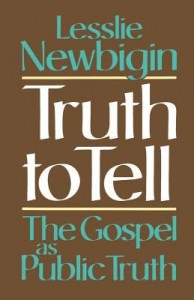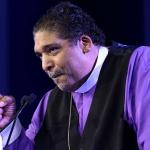For Everyone
I confess, Newbigin’s assertions that the Christian claims make their claims on whole societies makes me nervous. I found myself thinking more than once that his Church of England marriage of Church and State had him too far slanted on the integration of church and state model than I am comfortable with.
But in the end, I think he actually achieves a balance that I resonated with.
The freedom of the church is the freedom to speak truth to power. And, it is the freedom to speak truth to the Powers.
This means a call for political engagement without acceding to the mandates of preexistent parties or agendas. It means recognizing that political powers are powers created under and for the Lordship of Christ, so their functioning and thriving will depend on their reflecting the kind of rule that Christ exerts.
Here I come back to what is perhaps the central lack in Newbigin’s work. He never extrapolates on what he understands this Christ message to be. At its heart, I see the Jesus message being one in which life is found in the laying down of power so that others might live. I see it as power rising up from below and flowering to surprising abundance for those who had none rather than coming down from above and raining hell on all who stand in its way.
But too few take the cross as the interpretive key of what it means to walk in the way of Jesus. If I’m honest, I would rather have a completely secular state than a state in which the wrong Christians (as determined by me, of course), exert their authority in the name of Jesus.
We’re not first century Romans. We cannot engage in Anabaptist retreat. We have our vote and our voice. Those, at least, we must use. But how do we speak for the way of Christ?
Wherever You Are
In what might be the highlight of the book, Newbigin talks about this mission as one of subversion. The changes rarely, if ever, come in the big-picture blowing up of everything that was here before we showed up. More often, it means people climbing in, and quietly enacting the way of Jesus in a system that’s designed to function otherwise.
He asks what it would take for a psychiatrist or public school teacher or corporate executive or lawyer to acknowledge the saving work of Christ in their work psychiatrist, teacher, exec, or lawyer.
Here again, I get very nervous. I’ll be honest: for the most part I would rather have my kids taught by people who aren’t trying to work Jesus into the curriculum. Too much to undo when the kids get home.
So for me, this comes down to correctly nailing down what this truth is that we’re on about. Something I wish Newbigin has talked more about. But I would want to see this vision enacted as people realize that “Jesus is Lord” means that the life-giving power of God is enacted in places where self-giving love is the rule of the day.
In places where profits are secondary to paying laborers a fair wage, the life-giving power of God is at work. Jesus in Lord.
In schools where students who have known only chaos and turmoil find places of peace, the life-giving power of God is at work. Jesus is Lord.
In law offices where justice is pursued rather than simply billable hours, the life-giving power of God is at work. Jesus is Lord.
In a psychiatry session where someone realizes that they are deeply lovable and deeply loved and thereby finds peace in the midst of struggle and trauma, the life-giving power of God is at work. Jesus is Lord.
If that’s the truth we have to tell, if that’s the world “made sense of” by the gospel, then yes, let’s tell this truth. This is the missional calling of the church.
















